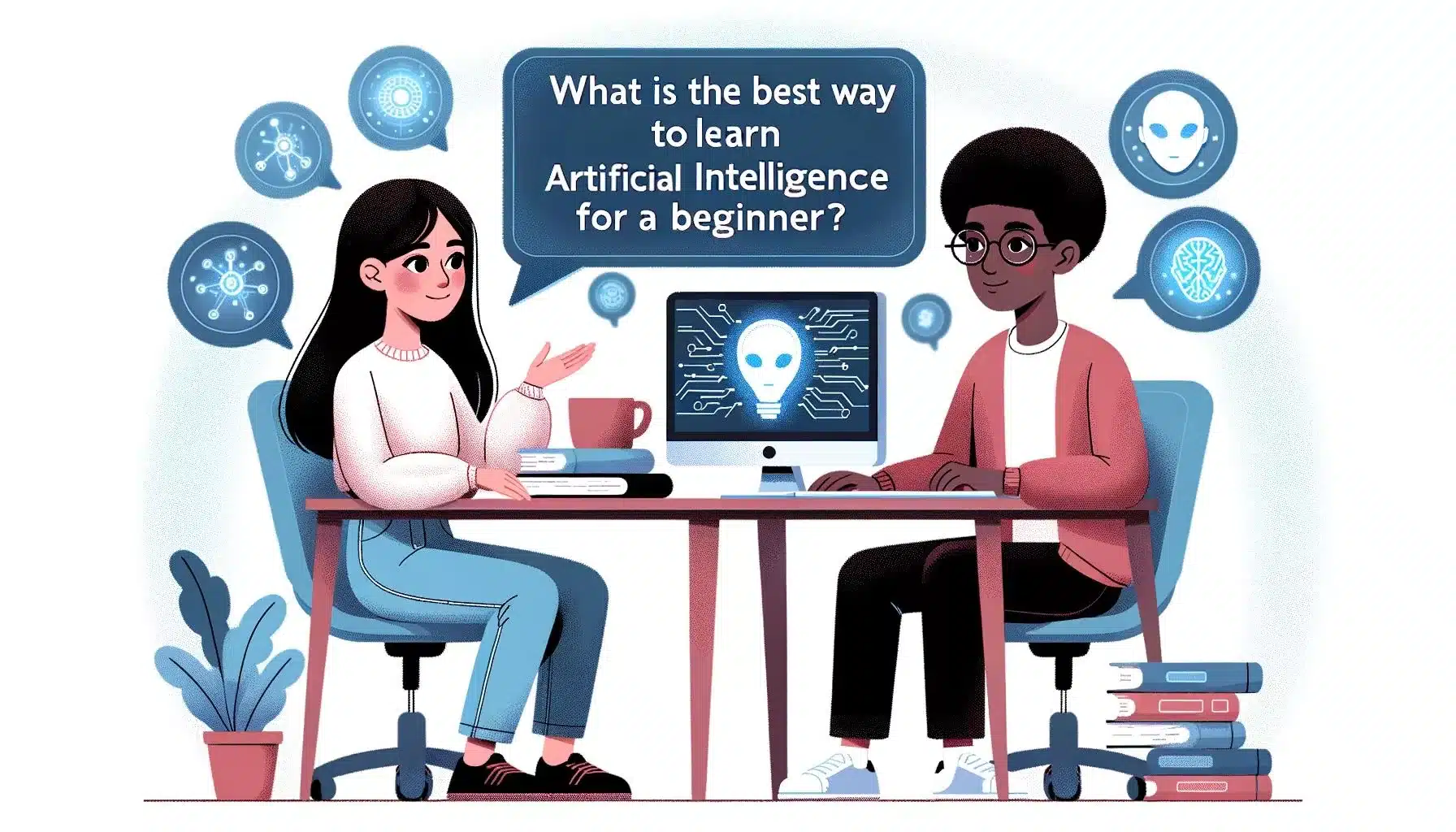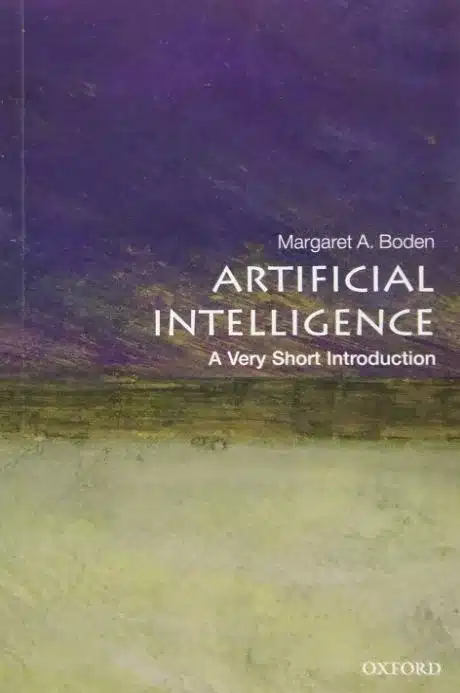What is the best way to learn Artificial Intelligence for a beginner?
Imagine stepping into a world where machines think, learn, and even make decisions. That’s the realm of Artificial Intelligence (AI), and it’s not just for tech wizards anymore.
Whether you’re a student, a professional looking to pivot careers, or just an AI enthusiast, this article is your go-to guide.
Here’s what you’ll gain from reading further:
- A clear roadmap for AI learning, tailored for beginners.
- Insight into the best resources, both free and paid.
- Tips on how to build a strong foundation in AI.
- Practical advice on how to apply your AI knowledge.
- A guide to networking and building a portfolio in the AI field.
This article is structured to give you the most important information right at the beginning. So even if you skim through, you’ll walk away with actionable insights.
| Section | Key Takeaways |
|---|---|
| Demystifying AI Myths | Uncover the truth behind common misconceptions about AI. |
| Selecting Your AI Niche | Identify the AI specialization that best suits your interests and career goals. |
| Mathematics: The Language of AI | Why a strong grasp of mathematics is essential for mastering AI algorithms. |
| Practical AI: Projects and Portfolios | The importance of hands-on projects and building a compelling AI portfolio. |
| The Power of Networking in AI | Effective networking strategies specific to the AI community. |
Understanding the Basics of AI
Before diving into complex algorithms and data structures, it’s crucial to understand what AI is and what it isn’t.
Artificial Intelligence is a branch of computer science that aims to create machines capable of intelligent behavior.
It’s not just about robots; it’s about algorithms, data analytics, and problem-solving.
Why is this important?
Understanding the basics will help you grasp more complex topics later on.
It will also help you discern between what’s realistic in the field of AI and what’s purely science fiction.
How to Start:
- Read introductory books on AI like “AI: A Very Short Introduction” by Margaret A. Boden.
- Take beginner courses on platforms like SkillShare or Udemy. Look for courses that offer a broad overview rather than diving into a specialization.
- Follow AI thought leaders and influencers on social media platforms to stay updated on the latest trends and discussions.
Choosing the Right Learning Path
AI is a vast field with various sub-disciplines, including machine learning, natural language processing, robotics, and more.
As a beginner, it can be overwhelming to decide where to start.
Why is this important?
Choosing a focus early on can save you time and resources.
It also allows you to build expertise in a specific area, making you more marketable in the job market.
How to Decide:
- Research the different AI sub-fields and identify which ones align with your interests and career goals.
- Consult with professionals in the field. Platforms like LinkedIn are great for this.
- Consider taking an introductory course in the sub-field you’re interested in. Websites like SkillShare offer a variety of courses that can help you make an informed decision.
Building a Strong Mathematical Foundation
Artificial Intelligence is deeply rooted in mathematics, and having a solid grasp of certain mathematical concepts is non-negotiable.
Why is this important?
Understanding the math behind algorithms will not only help you implement them but also innovate.
You’ll be able to tweak algorithms to suit specific tasks, and you’ll have a deeper understanding of the results you’re seeing.
How to Build Your Math Skills:
- Linear Algebra: This is the cornerstone of machine learning and AI. Concepts like vectors, matrices, and eigenvalues come up frequently. Resources like Khan Academy offer free courses on Linear Algebra.
- Calculus: Understanding how functions change when their inputs change is crucial in machine learning. Websites like Coursera offer courses on multivariable calculus which is used in optimization problems, a key part of AI.
- Probability and Statistics: AI often deals with uncertainty. Probability theory helps in understanding the world’s randomness, while statistics help in making predictions. Books like “Statistics” by Robert S. Witte provide a good starting point.
- Practice: Theoretical knowledge is not enough. Use platforms like Project Euler to solve problems and apply what you’ve learned.
Hands-On Learning and Projects
Reading and taking courses are great, but nothing beats hands-on experience.
Why is this important?
Practical application helps solidify your understanding and gives you real-world context.
It also provides you with a portfolio to showcase to potential employers or clients.
How to Get Hands-On Experience:
- Start Small: Begin with simple projects like a spam filter or a weather prediction model. Use platforms like InVideo to turn your projects into explanatory videos.
- Use Real Data: Websites like Kaggle offer datasets for various types of projects. Working with real data will give you insights into data cleaning, manipulation, and analysis.
- Collaborate: Join AI communities online or in your area. Working with others provides different perspectives and can often accelerate your learning.
- Showcase Your Work: Use GitHub to upload your projects. Write detailed README files to explain what each project is about, the technologies used, and what you learned from it.
Networking and Mentorship
In any field, especially one as dynamic and rapidly evolving as AI, networking is invaluable.
Why is this important?
Networking opens doors to opportunities you might not find otherwise.
It can lead to collaborations, job offers, or even just valuable advice from people who’ve been in your shoes.
How to Network Effectively:
- Social Media: Platforms like LinkedIn and Twitter are great for following AI experts and joining relevant groups. Don’t just be a passive observer; engage in discussions, share your thoughts, and even your work.
- Conferences and Webinars: These events provide a platform to meet like-minded individuals and experts in the field. Websites like Eventbrite often list relevant events you can attend.
- Mentorship: Having a mentor can accelerate your learning process. Websites like Fiverr offer mentorship services where you can get personalized guidance.
- Online Communities: Websites like Reddit and specialized AI forums are good platforms for networking. You can ask questions, share your projects, and get feedback from international peers.
Staying Updated and Continuous Learning
The field of AI is always changing. What’s cutting-edge today might be outdated tomorrow.
Why is this important?
Continuous learning is the only way to stay relevant in the field.
It’s not just about landing a job or completing a project; it’s about staying adaptable and up-to-date.
How to Stay Updated:
- Follow Industry News: Websites like Medium and AI-specific journals often publish articles on the latest research and developments.
- Online Courses: Even after you’ve got the basics down, continue taking courses to specialize further or to update your skills. SkillShare offers courses that are updated regularly to reflect the latest trends.
- Podcasts and Blogs: These are less time-consuming ways to stay updated. Platforms like Wondercraft offer AI-related podcasts that you can listen to even when you’re multitasking.
- Peer Reviews: Stay in touch with your network and regularly review each other’s work. This not only keeps you updated but also helps you view problems from different perspectives.
Conclusion
Embarking on a journey to learn Artificial Intelligence can be both exciting and daunting. However, with the right roadmap, resources, and network, you’re well on your way to becoming proficient in AI.
From understanding the basics and choosing your focus area to hands-on projects and continuous learning, each step is crucial.
Remember, the field of AI is ever-evolving, and so should you.
Ready to take the plunge into the fascinating world of AI?
Start today by choosing one resource from each section and dedicating time to it. The future is AI, and you could be a part of shaping it.
Frequently Asked Questions (FAQs)
Is a background in computer science necessary to learn AI?
While a background in computer science can be beneficial, it’s not a strict requirement. Many online courses and resources are designed to take you from zero to proficient, regardless of your background.
How long does it take to become proficient in AI?
The time it takes can vary widely depending on your starting point, the amount of time you can dedicate, and your end goals. However, expect to spend at least a year of focused learning to gain a solid foundation.
Are there any free resources to learn AI?
Absolutely. Websites like Coursera, Khan Academy, and even YouTube offer free courses on AI and its related mathematical concepts. Free e-books and research papers are also widely available.
What programming languages are most commonly used in AI?
Python is the most commonly used language due to its extensive libraries and community support. Other languages like R and Java are also used but less frequently.
Can I learn AI through online courses?
Yes, online courses are a great way to learn AI. They offer flexibility and often come with assignments and projects that give you practical experience. Websites like SkillShare offer a range of AI courses.
How important is math in learning AI?
Mathematics is crucial in understanding algorithms and data structures in AI. A strong foundation in linear algebra, calculus, and statistics is often required.
How do I stay updated with the latest trends in AI?
Following AI journals, attending webinars, and being part of AI communities online can help you stay updated. Platforms like Wondercraft offer AI-related podcasts that are both informative and up-to-date.
Can AI be self-taught?
Yes, many resources are available for those who prefer self-study. However, having a mentor or being part of a learning community can accelerate your progress.


